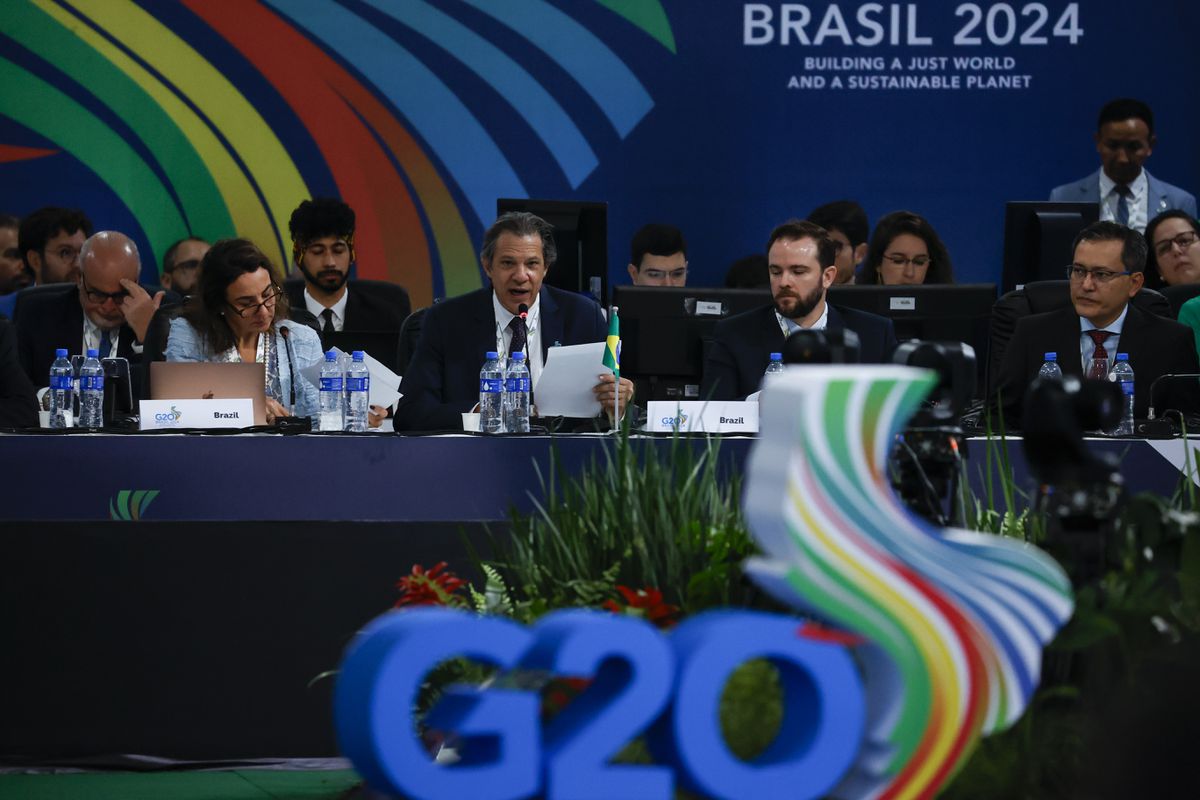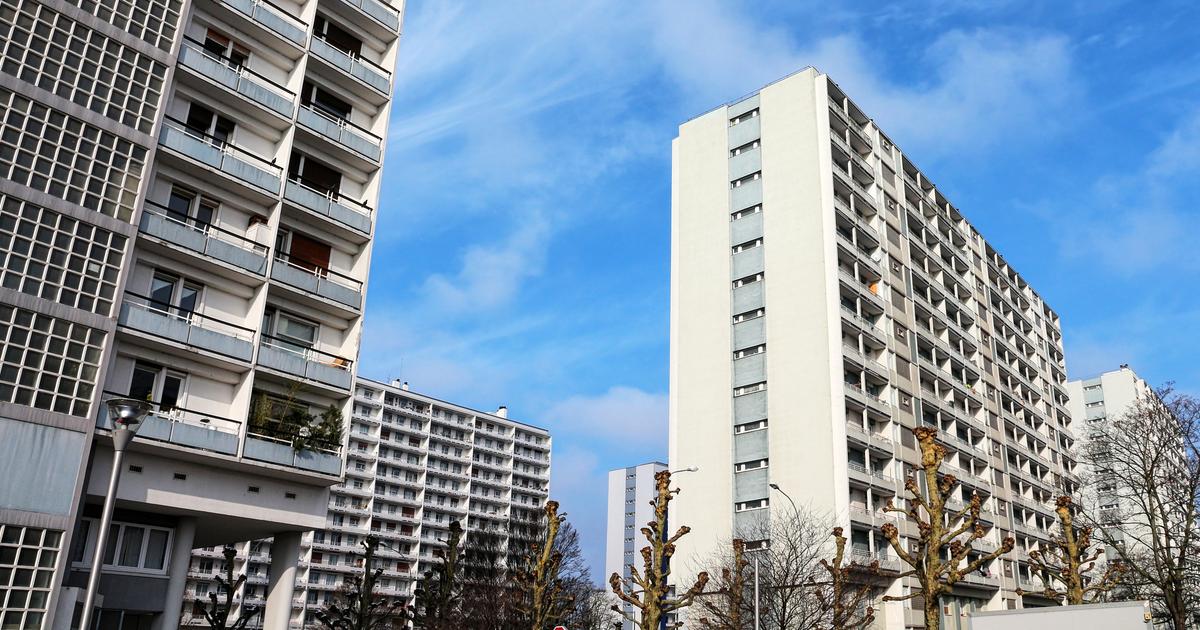Nigel Chalk speaks at an event part of the 2021 Annual Meetings of the International Monetary Fund.Cory Hancock (IMF Photo/Cory Hancock)
From his office in Washington, the economist Nigel Chalk (Bristol, 1968) connects to a video call with EL PAÍS, a couple of days after the International Monetary Fund (IMF) has published a bittersweet report with its estimates for this year.
Latin American economies such as Mexico and Brazil have been stronger than expected, but a slowdown is inevitable.
Inflation will continue to worsen the living conditions of the poorest and the war in Ukraine will continue to generate geopolitical instability.
“The system proved to be more resilient than we thought,” says Chalk, acting director of the Fund's Western Hemisphere Department, “but it will be a difficult year.”
Chalk took over from his predecessor Ilan Golfajn in October when he ran for the presidency of the Inter-American Development Bank (IDB), which he took over in January.
Chalk has worked with the Fund for 27 years on and off where he has studied crises in emerging markets.
“Russia in the 1990s, Brazil in 2022, Argentina in 2005,” he enthusiastically recalls, “more recently I have moved to work in countries that are not lending members but are engaged in policy discussions.
So I was chief of mission for China for five years before arriving as chief of mission for the United States where I've been for the last nine,
nearly ten years."
“I'm embarrassed to say that, because normally we don't spend that much time on that job,” she adds jokingly.
The outlook for the group of emerging economies in Latin America is complicated, despite the fact that it has managed, so far, to navigate the increase in debt and social spending due to the pandemic.
But it was not without a sign of social discontent, with protests in Peru right now and demonstrations in other countries since the pandemic.
Question.
The Fund recently improved its economic outlook for this year in Latin America, but warns that a slowdown is coming.
Reply.
That's how it is.
I think we're pretty clear: almost everywhere, the economy is slowing.
And then some questions arise like who is going to be in recession?
Where will there be contraction?
That's kind of an underlying trend.
And I think that's where we see headwinds.
Speaking of Latin America, there is the cost of living crisis, the war in Ukraine, the tightening of global financial conditions, higher interest rates in almost the entire region.
We also expect a reversal of some of the fiscal policies that were implemented during the pandemic because countries have high debt.
I think that is creating the slowdown.
It is true that the slowdown is less abrupt than we had perhaps thought in October.
So in that sense, things are looking a little better,
but the world is still slowing down.
Just because it's a little better doesn't mean it's good.
This is the sense that we want to convey, that it's still going to be a difficult year, certainly more difficult than last year because of all these things that are happening.
The system proved to be more resilient than we thought, that's the good news, but it doesn't change that the circumstances were quite difficult.
Q.
Does this mean that the unexpected bounce is over and now the decline begins?
A.
Yes. Although we believe there is a tipping point, economies will bottom out later this year and inflation is coming down, the problem remains that people won't know the economy is bottoming out before it recovers.
Inflation will remain high.
So, if you are an average worker, you have lost salary purchasing power, you are worried about losing your job, your living conditions are deteriorating this year, although we tell you at a macro level that things are going to improve.
So I think this creates a little bit of tension.
The region should expect that average living standards are likely to worsen this year.
Q.
This is disturbing, especially when we think that the region has experienced strong social discontent in recent years.
How concerned is this for the Fund?
R.
We know what this discontent is due to and it is not surprising.
The pandemic was brutal.
In most countries it affected the poor the most, the on-site workers who couldn't not go to work, the ones who didn't have a safety net.
But it also affected the middle class a lot, we had businesses go bankrupt, many people suffered.
And shortly after we got out of that, high inflation hit us.
Wages do not keep up with inflation, which, again, hits the poor and middle class hardest.
In this economic context, worsening living standards, we expect more anxiety.
Not surprisingly, people are questioning what the government is doing.
Let them question their trust in the government and wonder how their living conditions are improving.
This worries us from several angles,
one of them is that it directly affects the activity.
The massive protests in Peru, for example, we already see how it is impacting tourism, with the forced closure of Machu Picchu.
It is also affecting growth because companies do not want to invest when stability is so uncertain.
Nor do new investments or new foreign companies enter the country.
People tend to hold on to their income, they don't consume as much, maybe they don't go out, they reduce their discretionary consumption.
Finally, it really has an impact on politics because when the system is so unstable, it is very difficult to make good policies, those that could generate a good distribution of income, for example.
We have seen in several Latin American countries that the policies that the majority of the population perceive as the most sensible become very difficult to legislate and implement.
These three things concern us: politics, the direct impact on people's well-being and this creation of more uncertainty.
Q.
What is an example of a well-perceived public policy that is difficult to implement?
A.
The tax reforms, for example.
When you have a lot of social unrest, it is really important to pass a tax reform in which the richest pay their due part.
It is very important to build trust in the government, to offer people a net that they can fall into if they lose their job, for example.
Trying to structure a tax reform, when you have interests that are obviously pulling in the other direction, while you are in a polarized political environment, it becomes very, very difficult.
Q.
It is clear that countries have to collect more to reduce their debt without affecting the protection of the most vulnerable.
But one easy way for the richest to evade taxes is through tax havens.
R.
I agree, that's a problem.
The Fund has supported two proposals.
First, we have been very supportive on the corporate side of the global minimum tax, which the United States and the OECD have tried to put in place.
If a foreign company makes all of its profits in a low-tax jurisdiction, it is not paying any tax.
The proposal says that if you are doing that the country will ask that a minimum tax be paid.
That seems to us a very reasonable reform to put a floor to this type of tax haven so that, instead of depending on tax havens to tax companies, they are taxed at home.
The US Treasury Secretary has been making a lot of point about that.
There is an OECD agreement that gives you a framework to do that and it is in the process of being adopted.
And the second thing that I think has been really important in that we have spent a lot of time on the exchange of tax information between countries.
Argentina is one of the recent countries that has just signed this agreement with the US to reciprocate tax information.
Both proposals are trying to get rid of a little bit of this international arbitration that you speak of.
The ultimate goal is that we want a fair system.
We want people with more income, more profit.
Q.
We have talked here about social unrest and anxiety about a higher cost of living.
What is it up to citizens to do?
R.
What is reasonable to expect from your government?
May they be good stewards of your resources, of the taxes you pay.
That they do not go to corruption, that they go to transparency.
The Fund has put a lot of effort into those things over the years.
It's very, very important because, again, it builds trust in what the government is doing, it reinforces the role of the government.
Linked to that is being efficient with spending.
Many countries are really inefficient.
They invest a lot of money in things that don't have a lot of benefits, either in social terms or in terms of growth, or they invest a lot of resources in ineffective redistribution.
We want redistribution to reach those who need it most.
A good example of inefficient redistribution is when countries see oil prices skyrocket and just give general subsidies to everyone so the rich get money and the poor get money.
That is not an efficient use of spending.
And finally, I think there is a question about what services the government should provide.
If the income base is limited, it is necessary to prioritize, what are the types of services that the country needs the most?
And what services maybe the government shouldn't be doing?
And we see this in many different countries.
Some countries have a very large footprint for the government, including through public companies and whatnot.
And some countries have a much smaller footprint.
Subscribe to continue reading
Read without limits
Keep reading
I'm already a subscriber


/cloudfront-eu-central-1.images.arcpublishing.com/prisa/O645Q5IDLJHDPB6BJQCWLA23HY.jpg)











